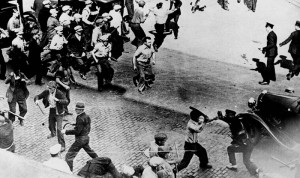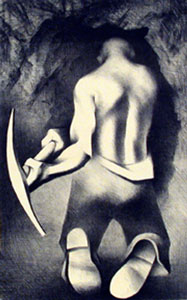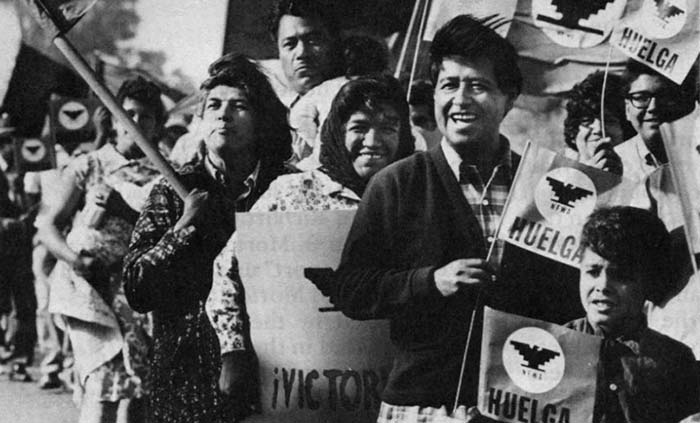Guest Sermon by A.J. Segneri
First Unitarian Church of Chicago
Sunday, September 1, 2013
I would like to take this opportunity to thank you for attending this Labor Day service, and I would like to especially thank those who helped plan and are participating in this service. Again thank you, and I would like to dedicate this moment to those laborers who have fallen during their fight for their rights.
In 1999, my friends and I took a trip to New Mexico to backpack for two weeks in the southern Rockies. On this particular backpacking trip we could visit various sites along the trail, and one of the sites was a coal mine where tours were offered. When we met the tour guide he provided us coal miner helmets and we all walked into the dark abyss of the mine. As we walked the football field length of the mine, we came across various equipment that stood unchanged through time. We listened to the stories of the conditions miners faced; such as fires, falling rocks, and methane leaks just so they could earn a paycheck for the amount of coal they hauled out. At the end of the tour, our guide told us to turn off our helmet lights and walk back out of the mine so that we could fully appreciate what these men did when their helmet lights went out
What I experienced out in New Mexico just a small piece of what has happened in our history. Our nation was built by workers who literally broke their backs, as well as poured sweat and blood to provide the basic needs for their families just so we can live comfortably. I would like to put this into a historical context.
On June 25, 1867 in California Chinese workers left their work project when laying tracks for the Trans-Contential Railroad, demanding $40 a month instead of the $35 a month they were receiving, plus a reduction in hours. We are also reminded of the painful memory of slavery when men, women, and children were tortured, given poor working and living conditions, and no pay for their work in the fields or around the plantations.
To bring this history closer to home, I am reminded of May 5, 1886, when 14,000 Milwaukee Iron workers demanded an eight hour work day. They organized in the city, and then struck. Gov. Rusk at the time ordered the national guard to shoot to kill any of the workers who came onto the premises of the factory. Seven, including a 13 year old, died that day. In her book Trapped Karen Tintori described the chilly Saturday on November 13, 1909 where 500 men and boys, young as 11, were working in the Cherry Mine in Cherry, IL. They were paid based on the amount of coal they could send to cities like Chicago, Milwaukee, and St. Louis. That afternoon the mine shaft caught on fire and collapsed on the workers. Only a few survived. This disaster was not only the biggest labor tragedy of its time, but also the inspiration for enacting compensation and child labor laws in this country.
Earlier you heard the statement from the workers during the Pullman Strike. That event was one of many labor battles our city endured. From the 19th Century Haymarket Strike to the 21st Century Chicago Teachers Union strike. Our city has been out front and center on labor issues. Events that occurred in our town also led to enact federal legislation and formed agencies to monitor the organizational behavior.
Over the course of history people have come together to fight for better policies within their work place, formed coalitions with other organizations, and even taken their fight to Washington DC to demand changes in federal policies. These efforts have led to an 8-hour work day, increased wages, better benefits, better working conditions, and much more.
So with those victories we ought to be satisfied, right? No. History is an evolving story, and it still continues today. We still have issues that we are facing in our nation. In Immokalee, Florida a coalition of workers that is made up of Haitian, Latino, and Mayan Indian workers receive low-wages just so fast food businesses, food services, and supermarkets are provided a product. Graduate students are fighting to be recognized as equal employees in academia for the work they do. Nurses who work tirelessly around the clock and are still not getting the respect from their health care facilities.

Open battle between striking teamsters armed with pipes and the police in the streets of Minneapolis, June 1934
A few years back a well-known organizer spoke at an event in Chicago. During his presentation I was inspired by some remarks he made, and I would like to paraphrase his remarks. Please help me out with the on-going theme. During the 1920s during the Great Depression, the cry was jobs and justice. During the 1963 march on Washington the cry was jobs and justice. In the 1990s when workers in Indonesia, China, and Vietnam struggled in NIKE sweatshops controversy the cry was jobs and justice. It is now 2013 where Occupiers, union organizers, and other activists are still crying out jobs and justice. WELL WAIT MINUTE..HOW LONG.. ARE WE GOING TO BE STILL STANDING OUTSIDE OF GOVERNMENT BUILDINGS, PRIVATE BANKS, ELECTED OFFICIALS OFFICES WHEN WE HAVE THE POWER TO DO THINGS FOR OURSELVES!!!
We are conditioned to believe that we cannot do things for ourselves, in terms of speaking out to the injustices that goes on in our workplace. In 2008 workers from then Republic Windows and Doors conducted a sit-in, so they can have better wages. Four years after that they did another sit-in just to keep the factory open. After having enough from the powers to be, the workers took matters into their own hands. So the workers bought the factory to form a workers cooperatives, which is now called New Era Windows.
Our land built on the backs of labor by men, women, and children of all demographics built from their own blood, sweat and tears just so that we can transport goods across the country, be provided with food at our tables, have facilities to work in, and so much more. The institutions that are causing these problems are doing more harm than good for their own people. While some are profiting, others are figuring out how they are going to stay in their homes or if they are going to have food for that week. Where is the quality of life for the workers? Where is the sense of responsibility to take care of those that are doing the work? Where is the sense of accountability of those businesses that are over-working and under-paying its employees?
All of us in this room can make a difference. How? By promoting personal responsibility on those who are not providing the best for their workers, fighting for economic justice, and voice to those in power to be future focused so that workers can sustain themselves, plus their families. If not, then we need to learn from those in history who had enough that were beaten down physically, emotionally, and financially when they were denied a living wage, humane working conditions, and offered benefits. Which was they were ready to strike, demonstrate, boycott, and if all fails, to rebel, for this is the great power exemplified by working class history.
I am honored this morning to be your guest speaker, and I would like to end with a quote by one of the great organizers, Cesar Chavez “The fight is never about grapes or lettuce. It is always about people”.



I think green party is doing the right thing.Keep going,we back you up.God ,be with you all.